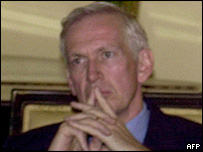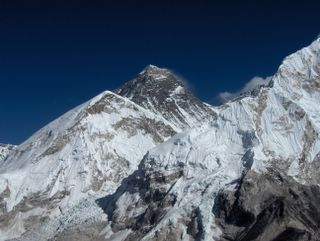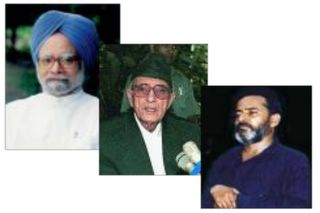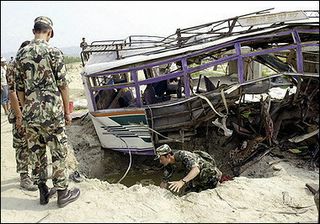Blogdai feels compelled to comment on Sanjay Upadhya's article below. This is a typical example of a U.S. based journalist (in this case, Nepali as well) who is a little out of touch. Throw in a few questionable sources and "voila" the story can unfold any way Mr. Upadhya sees fit. This article was reproduced from the usually very good scoop.com out of New Zealand. (Blogdai comments are in blue) People write this way about Nepal because they know no one will bother to check their facts. UNTIL NOW! Republicanism: How About A Real Public Debate?By
Sanjay UpadhyaAmid the flurry of political activity in Kathmandu and New Delhi in recent weeks, the myth surrounding the restoration of multiparty democracy in 1990 is being dispelled. From the outset, it was clear that the tripartite agreement among the royal palace, the Nepali Congress and a disparate alliance of communist factions was an uneasy one. The main communist faction, the Marxist-Leninist, had officially expressed qualified support for the new constitution. The party’s objections primarily centered on the role and privileges of the monarchy. It was hardly a secret that the communist parties’ acceptance of constitutional monarchy was a tactical decision. The comrades, not too surprisingly, saw the palace as a useful counterweight to the Nepali Congress’ ambitions.
(Not necessarily true. CPN-Marxist/Lenninist seemed to have no trouble playing ball withing the new system. CPN-Maoist came later and never made a real attempt to fit in. They were only communists in the most liberal sense of the word. A lazy journalist hears the word "communist" and automatically thinks about scheming "tactics")In the aftermath of King Gyanendra’s February 1 takeover of full executive powers, the Nepali Congress, too, has signaled that its support for constitutional monarchy is, at best, driven by expediency.
Ever since King Gyanendra dismissed the last elected government in October 2002 for failing to hold elections, Nepali Congress president Girija Prasad Koirala has been warning that the king’s political ambitions would compelled him to contemplate an alliance with the Maoist rebels to abolish the monarchy. This is surely a leap of faith for a man who headed the government that inaugurated the unleashing of state power against the rebels, who have been fighting since 1996 to establish a communist republic.
(A big innacurate guess. It's Koirala's ambition that kept him flirting with the maoists all these years. Also a leap of credibility to blame the King on the dismissal. Remember Deuba's first dismissal was precipitated by a petty feud with Koirala, who, in the end requested that the King dissolve the government.)Now Koirala’s one-time deputy, Ram Chandra Poudel, has gone a step further by asserting that King Birendra was not satisfied with the powers granted him under the constitution. For a party that proclaimed that King Birendra was the paragon of virtue when it came to adherence to the constitution, Poudel’s disclosure was revealing departure. Moreover, Poudel must have had to summon much antipathy to speak in the way he did against the former monarch around the fourth anniversary of the palace massacre that wiped out most of the royal family.
(This is just political maneuvering by Poudel. Birendra was the most "hands-off" monarch in the history of Nepal. He was a "paragon of virtue" during the time that Koirala and Poudel were stuffing their pockets with rupees, so they wouldn't dare speak ill of him during that time. This is a cheap shot against a dead and popular king that is crudely designed as a pretext to begin agitation against all forms of monarchy in Nepal. )The monarchy, to be sure, could not have been satisfied with the restricted political role the two major parties envisaged for him in the new constitution. What King Birendra announced on the night of April 8, 1990 was merely the lifting of the ban on political parties.
(If he was unhappy with his new powers, why did he lift the ban on political parties? It takes real talent to contradict yourself so thoroughly in the same paragraph the way our author does here) The ensuing days witnessed a struggle for power on the streets and in the media. The scales were tipped against the palace, already weakened by a crippling trade and transit embargo imposed by India. Fifteen years later, the palace stepped in to claim a role it believed it never had relinquished under the tripartite agreement.
(Nope, India acted because it's de-facto control under the Panchayat was finished, and nope, King G would have gladly ceded power to a competant and less corrupt parliament. He stepped in because nepal was spiralling towards anarchy at the hands of Koirala's idiocy and the Maoists brutality)Among the leaders still detained by the royal government after the lifting the state of emergency on April 30 are leading proponents of a constituent assembly. This is a key demand of the Maoists, who expect the elected body to transform the kingdom into a republic. The detentions indicate that the palace is ready for a showdown regardless of the quarter it emanated from.
(Maoists love a constituent assembly because they know that they can pressure election outcomes in their favor in those distant, unsupervised districts and thus, insure a Maoist majority)Koirala, the leader of the seven-party anti-palace alliance formed last month, is currently in India for medical treatment. He has been holding talks with sympathetic Indian leaders in an effort to consolidate the democracy movement in Nepal. Advocating a “fight to the finish for full democracy”, he may be contemplating some kind of alliance with the Maoists, who have acknowledged opening their own contacts with key Indian leaders. It remains unclear, though, whether the latest consultations would help clarify the republican agenda.
(It is no co-incidence that old Girija lands in Delhi on the heels of Babu Ram Bhattari's consultation with Indian spooks. It seemed that during his tenure as PM Girija was always going to India for "medical treatment." He is India's lap-dog and their last hope for regaining any kind of political control over life in Nepal. Blogdai has been predicting a Maoist-Seven Party alliance since the day of the Royal takeover. Indeed, precious little has been heard so far. Considering the Nepalese political parties’ propensity for polarization while in power – a trait preponderant during the two phases of multiparty democracy in 1951-1960 and 1990-2002 – the contours of a republican future need to be drawn clearly. The process needs to begin with a precise definition of the relationship between the head of state and head of government, including role, functions and powers.
To some extent, a United States-style presidential system might help avoid conflicts. Since such a model would be seen centralizing power in one branch, legislative and judicial checks and balances acquire special attention.
(Right, finally! Only that blogdai wrote this months ago.)An Indian-style prime ministerial model would envisage a titular head of state. Since the president would be the supreme commander of the armed forces, the command-and-control conflicts the mainstream parties see under the monarchy would still exist. This issue acquires additional urgency in view of the heavy politicization of the police force and bureaucracy under successive elected governments.
(Nonsense. This "politicization" did exist, but it was one of the factors that helped trigger the royal takeover. There is no "urgency." These types of bureaucrats are now gone and would not be allowed to resume thier business under any new government. an "Indian style" bureacracy model is what got Nepal into this mess in the first place)Irrespective of the model, effective safeguards against potential conflicts between the executive and legislative branches must be put in place. Questions relating to the president’s tenure, including impeachment, must be addressed vigorously, considering the frequency with which no-confidence motions were introduced against the prime minister in the past.
The prime minister’s prerogative to dissolve parliament and call fresh elections, a subject of much divisiveness in the past, must be clearly addressed. There are legitimate issues concerning the judiciary, especially since each prime minister that dissolved the House of Representatives was eventually challenged in the Supreme Court.
In the case of direct elections to both offices, the issue of power-sharing by a president and prime minister representing rival parties becomes crucial. French-style “cohabitation” under which jurisdictions for foreign and domestic policies are clearly laid out, might provide some insights.
(Mr. Sanjay mentions French-style cohabitation while illustrating an American model of bicameral legislation. He's been in the U.S. too long. No western model of democracy will adequately fit the unique needs of this rural Asian culture. A Nepali form of democracy is the only long-term answer. Everything else, as we've seen before, is just a license to steal.)Awaiting greater clarification, though, is the precise mechanism of ushering in a republic. The current discussions on a constituent assembly remain superficial. Worse, they presume that the popular verdict is already known. Will voting be conducted along the present first-past-the-post system or proportional representation? How can traditionally underrepresented groups expect their voices and concerns to be heard? Would the people’s representatives elected on diverse platforms assemble to vote on a future model? Or would the issue be put directly to a referendum? Considering the deep divisions in the electorate, how would each of the alternative outcome scenarios be addressed? Who exactly will be drafting a new constitution? Discussions have focused too narrowly on how the palace might react to an adverse result. How would the mainstream parties and the Maoists respond to an outcome not to their liking?
In the case of a republican victory, how would the ambiguities contained in the Maoists’ commitment to their ultimate goal of establishing a communist republic be addressed? This question becomes all the more important in view of the growing interest and influence of external powers in Nepal.
(Sanjay starts to go nuts here. If the model held, Maoist concerns would have already been addressed through the republican process. The best that we can garner from the above paragraph is that Mr. Upadhya has completed some kind of introductory U.S. government course. He's throwing out terms that are unrelated to the discussion and far past the issues in Nepal today. Boilerplate verbosity.)India, United States and Britain, among other countries, the monarchy has been the pivot of stability since the 1950s. Public support, tradition and continuity have conferred special legitimacy to the institution, which external powers have acknowledged and incorporated in their policies vis-à-vis the country.
(Yes. the U.S. knows only two things about nepal politics: King stable, Koirala senile.)A full Maoist takeover would hardly be acceptable to them, albeit for different reasons. The United States, which sees its victory over communism as a seminal event of the last century, would hardly countenance such a brazen reversal of that reality. Moreover, Washington has designated the rebels a terrorist group.
The Maoists, who have carefully calibrated their postures in keeping with the exigencies of the moment, may be ready to shed some of their doctrinaire policies and rhetoric in exchange for legitimacy. However, it remains doubtful whether they would be ready to change the party name and flag in exchange for western support, especially when the far more moderate Unified Marxist-Leninists have not been able to do so.
(Sure they're ready, Sanjay. That's why they blew up that bus in Chitwan, right? Even a cursory understanding of diplomacy will tell you that Maoism, in any form, will never get western support for any reason)Despite misguided attempts to portray a Chinese hand behind the insurgency, it is clear that Beijing would hardly acquiesce in the emergence of a hard-line Maoist government in Nepal. The Nepalese Maoists continue to espouse aspects of the Cultural Revolution -- including class conflicts and retribution – which modern-day Chinese communists would prefer to forget. Moreover, at a time when economic reforms have left a huge rural-urban income divide in China, the communist leadership in Beijing cannot be unaware of the destabilizing effects of a homegrown yet antiquated ideology in a volatile part of South Asia.
(Misses the point entirely. Maoists and China are like apples and oranges. China has already publicly rejected Nepal's Maoists. To imply that Maoist destabilization in Nepal could somehow effect rural Chinese is alarmist and infantile. Nepal has no influence whatsoever on any aspect of Chinese life or culture. No, China wants other things. No hand in the takeover? What about Paras's return to kathmandu from china just days before Feb. 2? What about the abrupt closure of the tibetan welfare office in kathmandu during that same time? What about the carefully constructed Chinese statement praising Nepal's attempt at "ethnic pacification" and vowing to stay out of the "internal affairs" of nepal released almost concurrent with the King's takeover? Only two things will ever drive China's Nepal policy. First, harrass the Tibetans at all costs. Second get nepal out of India's sphere of influence. How? An unstable Nepal, either by Maoists or Koirala reinforces Nepal's traditional and cultural dependence on big brother India. A stable nepal, either by monarchy or functioning democracy, promotes nepal's independence from India and a willingness to engage China more on an international level. As for India, extreme left-wing insurgencies grip some 40 percent of the country’s 593 districts. A full-fledged Maoist takeover in Nepal would serve to energize these groups into forging their wider compact revolutionary zone in South Asia. Considering the long and porous border between the two countries and the peoples’ longstanding links, sections in the Indian establishment might be willing to contemplate a Maoist-dominated republican Nepal under the presidency of, say, the Nepali Congress.
(keep pushing that alliance, sanjay. He's slipping fast here. He's saying that India wants a Maoist controlled Nepal that is run by the Nepali Congress. Come to think of it, after a second reading, this man is either insane or has stumbled onto the key to the whole thing, hmm..)Indeed, New Delhi’s recent decision to open direct channels of communication with the Nepalese Maoists, purportedly under the auspices of leftist supporters of the ruling coalition, could be aimed at facilitating such an alliance. Would the vociferous Hindutva element in India accede to the destruction of the world’s only Hindu kingdom?
(what could they do about it? a tangenital issue. this is space filler)Despite the much-hyped bonhomie between China and India, New Delhi’s enthusiasm in defining a new state structure in Nepal would clearly sensitize Beijing. Growing cooperation between the world’s two most populous nations cannot mask the reality that they are also competitors. The limits to conciliation have been on display for some time.
Despite India’s full recognition of Tibet as an integral part of China, Beijing has hardly shown unequivocal reciprocity on the issue of Sikkim, the Himalayan kingdom India annexed in 1974. China’s reticence on India’s candidacy for a permanent seat on the United Nations Security Council provides yet another illustration of this complex relationship.
In keeping with its massive economic expansion, China has decided to deepen its strategic influence in the region, especially with Pakistan, Bangladesh, Nepal and Sri Lanka. According to a report published in April by Washington DC-based Jamestown Foundation, Nepal’s strategic location makes the kingdom an important part of South Asia. Nepal's borders meet China's restive western province of Tibet on the one hand, and Naxalite-dominated Indian states on the other.
(Fine, Sanjay, but how does this material relate to Republicanism? Why don't you write another article about China/India relations and stop confusing us with this extra material?)China has traditionally viewed the monarchy as the cornerstone of its Nepal policy. Weeks after describing the royal takeover as an "internal matter," China sent Foreign Minister Li Zhaoxing to Nepal in a clear gesture of support. Jia Qinglin, chairman of the National Committee of Chinese People's Political Consultative Conference, China's top advisory body, reaffirmed his country’s support during a meeting with King Gyanendra in April on the sidelines of the Boao Forum for Asia conference in Hainan.
In return, the Jamestown report says, China wants the Nepalese government to stay clear of any foreign (Indian or the U.S.) influence that could make trouble in Tibet. To further the goal of status quo in Tibet, China is integrating Nepal into the Tibetan economy, and laying a highway that will connect the two. Chinese President Hu Jintao, who served as Communist Party secretary in Tibet from 1988 to 1992, perhaps best understands the importance of this integration.
( Blogdai has read the Jamestown Foundation's report and has found it refreshingly accurate. A bit lightweight, but accurate. Nowhere in the report, however, is the language found in Mr. Sanjay's assertion above. This is pure lazy, inaccurate and phony journalism. The closest the report comes to the above paragraph attributed to it is: "Greater American involvement in Nepal may add to Beijing's anxieties in this regard." Read it. See for yourselves. http://www.jamestown.org/publications_details.php?volume_id=18&issue_id=651&article_id=4641This cuts to the core purpose of our blog. We must be constantly vigilant towards misstatements, exaggerations and outright lies emminating from the western media. Nepal is not El Salvador. Nepal is not North Korea. The King is not Idi Amin. Nepali culture is a unique entity; the operation of which does not fit snugly into some Westerner's definition. The United States, which joined India and Britain in arming and training the Royal Nepalese Army in its fight against the Maoists, has embarked on a deft policy. While the other two countries responded to the royal takeover by announcing a suspension of military assistance, the United States adopted a watch-and-wait policy. Publicly, Washington continues to emphasize policy coordination with New Delhi and London. Behind the scenes, Washington has engaged with Beijing, already is a key intermediary in the North Korean nuclear crisis.
The Bush administration, aware of China’s recent moves to fill a vacuum in Asian leadership, has assigned Deputy Secretary of State Robert B. Zoellick to head a permanent U.S. delegation to talk with China one a variety of international issues, including Burma, Nepal and Sudan.
In a 2002 report, the U.S. research organization Stratfor wrote that Washington has relatively little interest in Nepal's insurgency. However, it added, the Pentagon likely would not mind having another emergency air base or logistics center close to Pakistan and Central Asia. “In looking toward the longer term, the United States definitely wants as much of a presence on the border with China as possible,” the report said.
Beijing is well aware of Washington's intentions and is no doubt concerned about the U.S. encirclement that is already taking place, Stratfor said. “The U.S. military has bases in Pakistan, throughout Central Asia, Japan, South Korea and the Philippines, and it has relations with Mongolia, Taiwan, Singapore and Thailand. Nepal is another link in the chain,” it added.
Referring to India’s strategic decision in the mid-1990s to move closer to the United States, Stratfor said New Delhi hoped to benefit from increased trade, eventual access to U.S. weapons systems and the formation of a strong alliance to counter China. “However, American involvement with Nepal and Sri Lanka raises conflicting impulses. On one hand, New Delhi is glad to see Washington trying to clean up the insurgencies that have spilled over into its borders for years. On the other hand, there is a visceral reaction against foreign involvement in India's backyard, especially when those foreigners maintain strong ties with Indian rival Pakistan.”
The report added: “Many in India's foreign policy circles are concerned that Washington may replace India as the dominant power in South Asia, assuming that Nepal, Sri Lanka, Bangladesh and Bhutan prefer the freedom that comes with casting their allegiance with a distant giant rather than one close to home.” This, according to Stratfor, has dampened India’s hope of becoming the dominant power in the Indian Ocean and interacting with Washington as a near equal.
In an earlier report, Stratfor underscored Nepal’s strong geo-strategic value to world powers. “The power that stations its space-linked surveillance, intelligence and navigation systems on Nepal's high mountains gets geo-strategic leverage over several Asian regions, from Central Asia to South-East Asia,” the report said. (STRATFOR is one of those ridiculous, agenda-driven policy "think tanks" similar to the International Crisis Group. They hail from that great international hub of policy, Austin Texas. Blogdai has had many personal exchanges with Nathan Brown, the man who wrote the article mentioned above, and have refuted most of his claims. It is actually quite comical. Brown has the whole China/Nepal/India diaspora spinning wildly out of control to involve U.S. ships in the Indian ocean, Myanmar and the tibetans. All pure foolishness. Or is it? Comics sell faster than novels so who cares about accuracy, right? It's exciting to stimulate your dull-witted conspiracy-obsessed subscribers with wild speculation; STRATFOR does this to perfection)
Clearly, Nepal must brace for new domestic and international challenges. Proponents of a republican agenda need to persuade the people that the new model would be more effective than the monarchy in address these challenges. Rhetorical threats must not be allowed to take the place of substantive discussions. The accusation that King Gyanendra in this day and age is bent on reviving autocracy is an insult to the intelligence of the Nepalese people. (Absolutely right! Sanjay, why didn't you support this argument in any of the paragraphs above? As a nepali, you surely must also realize that doing away with the monarchy would be an even greater insult to the intelligence of the Nepali people, don't you?)
So, this article gets a low grade on our scale. What information that is correct is old news and perfunctory in nature. Like so many of his peers, however, Mr. Upadhya spins wild tales of "what could happen" under the cloak of ingnorance and obscurity that makes up the bulk of Nepal reporting. We at blogdai love catch these people and call them into account every chance we get. Stay tuned for more...
-=blogdai





